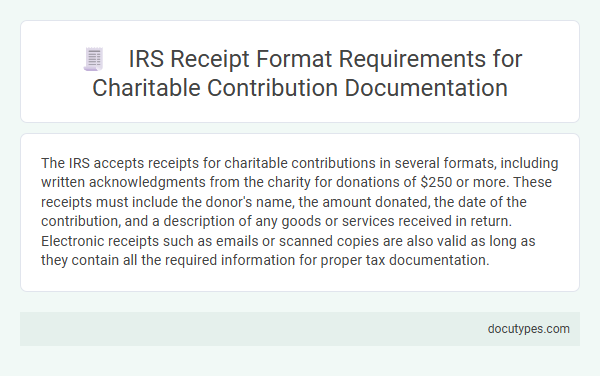The IRS accepts receipts for charitable contributions in several formats, including written acknowledgments from the charity for donations of $250 or more. These receipts must include the donor's name, the amount donated, the date of the contribution, and a description of any goods or services received in return. Electronic receipts such as emails or scanned copies are also valid as long as they contain all the required information for proper tax documentation.
Understanding IRS Guidelines for Charitable Contribution Receipts
The IRS requires specific receipt formats to validate charitable contributions for tax deduction purposes. Understanding these guidelines helps ensure compliance and proper documentation.
- Receipt must include donor information - The receipt should clearly state the donor's name to associate the contribution with the taxpayer.
- Details of the contribution - The date and amount of the donation need to be explicitly recorded on the receipt.
- Organization acknowledgment - The charitable organization's name and a statement confirming whether any goods or services were provided in exchange must be included.
Essential Elements of a Valid Charitable Donation Receipt
| Essential Elements of a Valid Charitable Donation Receipt | Details |
|---|---|
| Donor's Name | The receipt must clearly state the full name of the individual or entity making the donation. |
| Charitable Organization's Name | The official name of the IRS-recognized nonprofit organization receiving the contribution. |
| Date of Contribution | The exact date when the donation was made or received by the charity. |
| Donation Amount | The total monetary value contributed. For non-cash donations, a description of the donated items without valuation. |
| Statement of Goods or Services | A declaration whether any goods or services were provided in exchange for the donation. If so, the receipt must describe them and state the fair market value. |
| Declaration of Tax Deductibility | A clear statement indicating that the contribution is tax-deductible to the extent allowed by law. |
| Charity's Signature or Authorized Representative | Receipt should include the signature or official acknowledgment by the organization's representative. |
| Tax Identification Number (TIN) or Employer Identification Number (EIN) | The organization's IRS-issued EIN for verification purposes. |
Required Wording and Phrasing for IRS-Compliant Receipts
The IRS requires specific wording and phrasing on receipts for charitable contributions to validate tax deductions. Proper receipt format ensures compliance and facilitates donor recordkeeping for tax purposes.
- Written Acknowledgment - The receipt must clearly state that no goods or services were provided in exchange for the donation, or describe any benefits received.
- Donation Amount - The exact dollar amount of the contribution must be prominently displayed on the receipt.
- Organization Details - The receipt must include the organization's name, the date of the contribution, and a statement confirming its tax-exempt status under IRS rules.
Dollar Amount Documentation and Fair Market Value
Which receipt format does the IRS accept for charitable contributions? The IRS requires written acknowledgment for contributions of $250 or more, including the date, amount, and description of the donation. Receipts must also document the fair market value for non-cash donations to validate tax deductions.
Receipts for Cash vs. Non-Cash Charitable Contributions
The IRS accepts different receipt formats for charitable contributions depending on whether the donation is cash or non-cash. For cash contributions, a written acknowledgment from the charity is required for donations of $250 or more.
Receipts for cash donations must include the charity's name, date of the contribution, and the amount given. Non-cash contributions over $500 require a detailed description of the donated items and their fair market value. Your receipt should also state whether any goods or services were provided in exchange for the donation.
Quid Pro Quo Contributions: Disclosure Statements
The IRS requires a specific receipt format for quid pro quo contributions, where donors receive goods or services in return for their donations. These disclosure statements must clearly state the estimated value of the goods or services provided, allowing the donor to determine the deductible amount. Proper acknowledgment ensures compliance with IRS regulations and protects both the charity and the donor.
Electronic vs. Paper Receipts: Acceptable IRS Formats
The IRS accepts both electronic and paper receipts for documenting charitable contributions. Proper format and content are crucial to ensure the receipt meets IRS requirements.
- Electronic Receipts - Emails and downloadable PDFs are accepted as valid receipts if they include all necessary donation details.
- Paper Receipts - Handwritten or printed receipts must contain the donor's name, donation date, and amount to qualify for IRS deductions.
- Required Information - Both formats must clearly state the charity's name, date of contribution, and a description of any non-cash donations.
Donors should retain these receipts to substantiate charitable contributions during tax filing and audits.
Timing and Deadlines for Issuing Charitable Receipts
The IRS requires charitable contribution receipts to be issued no later than the date the taxpayer claims the deduction. Receipts must include the organization's name, the donation date, and a description of the contribution for it to be valid. Timely issuance ensures compliance with IRS deadlines and supports accurate tax filing for donors.
Common Mistakes to Avoid in Charitable Contribution Documentation
The IRS requires a written acknowledgment for charitable contributions over $250 to qualify for a tax deduction. Receipts must include the donor's name, the organization's name, the date of the contribution, and a description of the donation.
Common mistakes in charitable contribution documentation include failing to obtain a proper acknowledgment and not specifying whether any goods or services were received in return. Omitting these details can result in the deduction being disallowed by the IRS.
Which Receipt Format Is Accepted by the IRS for Charitable Contributions? Infographic

